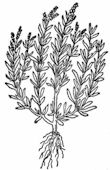 |
Tarragon (Artemisia
Dracunculus).—This aromatic herb is used for a variety
of purposes, but is most commonly employed for imparting
its powerful flavor to vinegar. The plant is a
perennial, and must be propagated by divisions in March
or April, or by cuttings placed in gentle heat in
spring. Later in the year they will succeed under a
hand-glass in the open. Green leaves are preferable to
those which have been dried, and by a little management
a succession of plants is easily arranged. For winter
use roots may be lifted in autumn and placed in heat.
Those who have no facilities for maintaining a supply of
green leaves rely on foliage cut in autumn and dried. |
Description
Tarragon is an herbaceous perennial that grows to about
2 feet tall. It has multibranched growth with narrow,
somewhat twisted, green leaves.
Culture
Tarragon will grow in full sun but seems to do better in
semishade. It can be propagated from root cuttings or by
division. It needs protection in winter in cold
climates. Make new plantings every 3 to 4 years.
Harvesting
It is best to use fresh young leaves and stem tips.
Flavor is lost when tarragon is dried.
Use
Tarragon leaves have a distinctive flavor similar to
anise and are used in salads, marinades, and sauces.
Leaves yield flavor to vinegar when steeped.
"Adapted from publication NE-208, produced by the
Cooperative Extension Services of the Northeast States." |
|
|
Garden
Herbs
Home
History of Herbs
Herb Gardening
Herbs for Beginners
Drying & Preserving Herbs
Indoor Herb Gardening
Herb Garden
Hints & Tips
Herbal
Cooking
Herb Chart
Using Herbs
Culinary Herbs
Herb
Oil and Vinegar
Herb Teas
Herb Candy
Herb Jelly
Herb Simples
Preface
Introduction
Alphabetical Listing

Trade
Recipes Online
Share your Recipes with others!!
|


